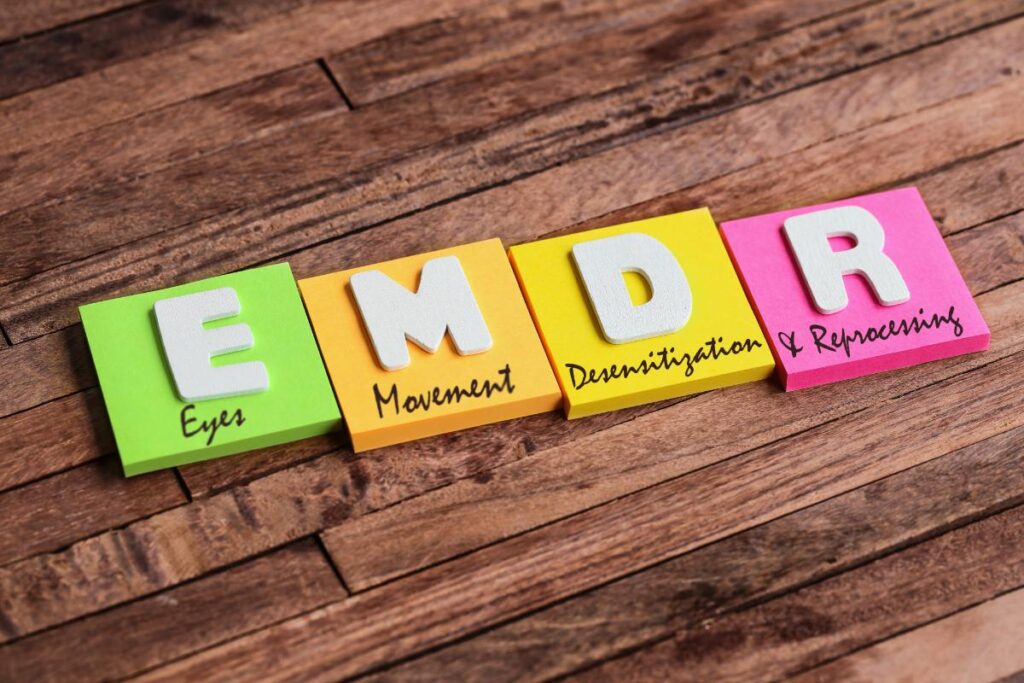Trauma and addiction often go hand-in-hand. Individuals with untreated trauma frequently self-medicate with drugs or alcohol to manage trauma symptoms. When trauma and addiction co-occur, it is critical to address both in treatment to break the cycle of dysfunction they create. Eye movement desensitization and reprocessing (EMDR) is a therapeutic approach initially developed to treat post-traumatic stress disorder (PTSD), which is a typical result of trauma. EMDR therapy for addiction can be an effective treatment option for individuals struggling with addiction and trauma.
Call Vertava Health at 844.470.0410 to learn more about the benefits of EMDR therapy for addiction treatment. Our EMDR therapy program is designed to help individuals process and heal from traumatic experiences that may be contributing to their addiction.
What Is EMDR?
EMDR therapy is a type of psychotherapy that involves using eye movements or other bilateral stimulation (such as tapping) to help individuals process and heal from traumatic experiences. It was created by psychologist Dr. Francine Shapiro in the late 1980s after she observed that certain eye movements seemed to reduce the intensity of her own negative thoughts. Since then, EMDR has been extensively researched and is now recognized by organizations such as the World Health Organization (WHO), American Psychiatric Association, and U.S. Department of Veterans Affairs as an effective treatment for PTSD.
How EMDR Works
When trauma is not effectively processed, it gets “stuck” in the brain. EMDR aims to change the thoughts, emotions, and behaviors that result from trauma so the brain can resume the natural healing process.
EMDR uses visual, tactile, and auditory stimulation to activate both sides of the brain simultaneously, fostering rapid processing. This process moves the traumatic memory from being stuck in the brain’s emotional center to being processed in the logical center. While EMDR therapy does not erase painful experiences, it allows patients to acknowledge them without feeling like they are reliving them.
Understanding the Benefits of EMDR Therapy for Addiction Treatment
Significant benefits of EMDR therapy for addiction treatment include:
- Addressing underlying trauma – EMDR can help patients adequately process and heal from traumatic experiences, potentially reducing triggers that fuel addictive behaviors.
- Reducing triggers and cravings – EMDR can reduce the frequency and intensity of triggers and cravings that impact substance use by reprocessing memories and associations.
- Developing coping skills – EMDR can be used to foster coping strategies for stress, anxiety, and other emotions that contribute to substance use, including addressing negative beliefs and self-perceptions.
- Enhancing self-esteem and empowerment – EMDR can strengthen self-esteem, self-worth, and self-efficacy, vital to maintaining sobriety.
- Reducing the impact of “using memories” – Patients with SUD often have vivid, emotionally charged memories of using drugs or alcohol. EMDR can help desensitize these memories.
EMDR therapy for addiction treatment can enhance one’s life in multiple ways.
Is EMDR for Addiction Therapy Right for Everyone?
While EMDR has been proven effective for many and in various settings, it may not be suitable for everyone. At Vertava Health, our experienced treatment team members take the time to develop individualized treatment plans for all patients.
Following are some of the considerations for determining whether or not to incorporate EMDR in addiction therapy:
- EMDR is primarily designed to address issues related to trauma, so it may not be the best fit for mental health conditions that do not involve traumatic experiences.
- What works for one person may not work for another. Individual differences can influence how patients respond to EMDR.
- Some patients may not be emotionally or psychologically ready for EMDR therapy. Readiness and willingness to participate in the process are critical to the success of EMDR.
- Certain medical or mental health conditions may impact a patient’s ability to participate in EMDR therapy.
- EMDR is generally better suited to patients with more severe symptoms, such as flashbacks, nightmares, or intense anxiety, associated with trauma.
The effectiveness of EMDR also depends upon the competence and experience of the therapist. EMDR is a specific approach that requires specialized training.
Reach out Today to Learn More About EMDR for Addiction Treatment at Vertava Health
EMDR therapy helps patients address the distressing emotions and memories related to trauma. At Vertava Health, our addiction and mental health experts understand the relationship that often occurs between trauma and addiction. To learn more about our EMDR therapy for addiction, reach out online or call 844.470.0410.


